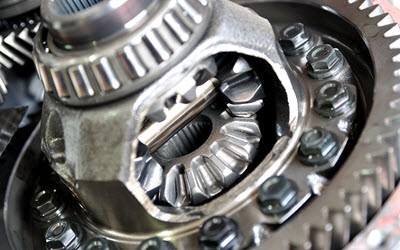Differential failure can occur over time, leading to several problems in your Mercedes-Benz. As a responsible car owner, you should have a good understanding of the signs of differential failure and take appropriate action to prevent it from causing further damage to your luxury car. By familiarizing yourself with these tips, you can safeguard your Mercedes and ensure a trouble-free driving experience. However, before diving into the identification and causes of differential failure, let’s take a moment to understand what a differential actually is.
What is a Differential?
In simple terms, a differential is a gearbox located between the rear wheels of your car. Its primary function is to distribute torque, or power, evenly between the two wheels, allowing them to rotate at different speeds when necessary, such as during turns. There are several reasons this can fail:
- Lack of Lubrication: The most common cause of differential failure is insufficient lubrication. The differential relies on lubricating fluid to reduce friction and prevent excessive wear on its internal components. Over time, the lubricating fluid may degrade or leak due to seal failures or other issues. Without proper lubrication, the differential gears, bearings, and other parts can experience increased friction, heat buildup, and accelerated wear, eventually leading to its failure.
- Overloading: Exceeding the recommended load capacity or towing capacity of your Mercedes can put extra or excessive strain on the differential. The differential is designed to handle a specific amount of torque and load. When you overload the vehicle or tow heavy loads beyond its capacity, the differential is forced to work harder, generating more heat and stress. This can result in premature wear and failure of the differential components, such as gears, bearings, and seals.
- Aggressive Driving: Frequent aggressive driving behaviors like hard cornering can place significant stress on the differential. When you accelerate forcefully or abruptly apply brakes, it can create sudden changes in torque, putting additional strain on the differential. Hard cornering, especially at high speeds, increases lateral forces on the differential, causing it to work harder and potentially leading to failure over time.
How to Properly Identify Differential Failure
- Unusual Noises: One of the most common signs of differential failure is the presence of strange noises. If you hear a whining, clunking, or grinding sound coming from the rear of your Mercedes, especially during acceleration or when turning, it could indicate a problem with the differential. These noises can be a result of worn-out bearings, damaged gears, or lack of proper lubrication.
- Difficulty in Turning: Another red flag to watch out for is experiencing difficulty when making turns. If your car feels like it’s resisting or not turning smoothly, it might be due to a failing differential. You should also pay attention to any unusual vibrations or jerking sensations while turning, as they can also be indicators of a potential differential issue.
- Leaking Fluid: The differential requires lubrication to function correctly. If you notice any fluid leaking from the rear end of your Mercedes, particularly near the differential, it could be a sign of a failing differential. Keep an eye out for any oil spots on the ground where you typically park your car. Leaking fluid can lead to inadequate lubrication, causing increased friction and potential damage to the differential components.
- Uneven Tire Wear: A malfunctioning differential can result in uneven tire wear. Regularly inspect your tires and check for signs of excessive wear on one side compared to the other. Uneven tire wear can indicate that the differential is not effectively distributing power evenly to both wheels. This issue can be caused by worn-out differential gears or other internal components.
By being attentive to these signs, you can proactively identify differential failure in your Mercedes and take appropriate measures to address the issue promptly. Remember, early detection and timely repairs can help prevent further damage and ensure the optimal performance and longevity of your Mercedes.
Call Our Experts for Your Mercedes Differential Issues
If you suspect any problems with the  differential in your Mercedes-Benz, you should take it to a professional mechanic immediately. At Master Mechanics Auto Repair, we are a professional auto repair workshop specializing in diagnosing and fixing differential issues and other problems in Mercedes. Our experienced team has earned a reputation among drivers from Battle Creek, Portage, and Kalamazoo, MI, for our expertise in handling Mercedes vehicles. Don’t hesitate to reach out to us for reliable and efficient differential repairs to keep your Mercedes running smoothly on the road. Call our service line now!
differential in your Mercedes-Benz, you should take it to a professional mechanic immediately. At Master Mechanics Auto Repair, we are a professional auto repair workshop specializing in diagnosing and fixing differential issues and other problems in Mercedes. Our experienced team has earned a reputation among drivers from Battle Creek, Portage, and Kalamazoo, MI, for our expertise in handling Mercedes vehicles. Don’t hesitate to reach out to us for reliable and efficient differential repairs to keep your Mercedes running smoothly on the road. Call our service line now!



